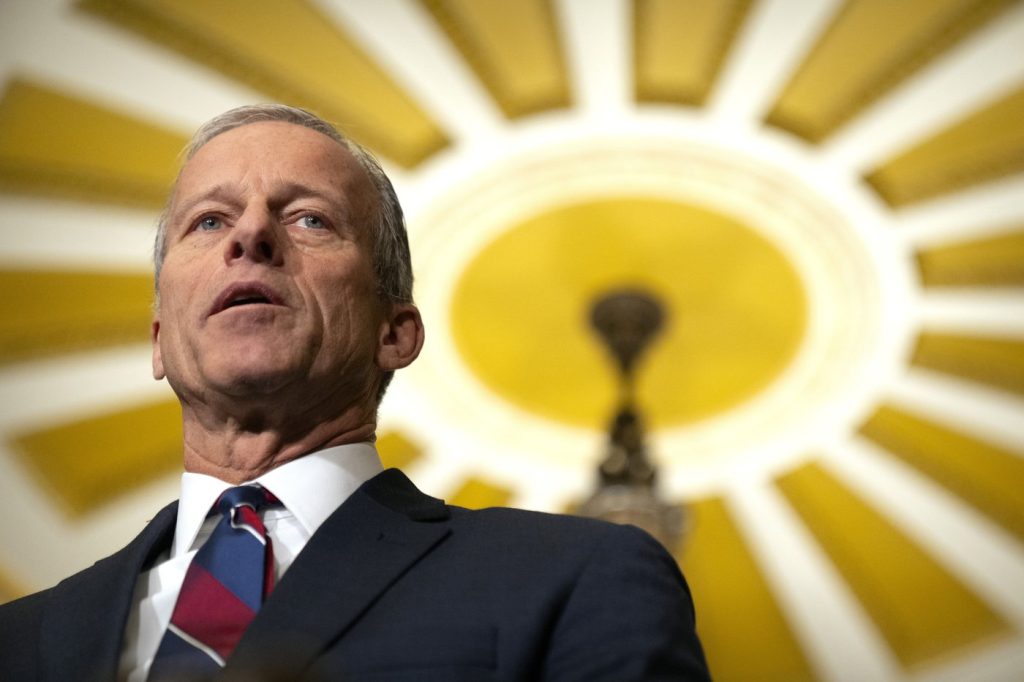The Senate is on the verge of a decisive vote on proposed legislation requiring federal authorities to detain migrants accused of theft and violent crimes. This bill, known as the Laken Riley Act, would also empower states to challenge federal immigration policies, setting a new tone for immigration under the incoming Trump administration. The act is named after Laken Riley, a Georgia student murdered last year by an undocumented Venezuelan national.
With Republicans now in control of the Senate, they have made the Laken Riley Act a priority, potentially making it the first piece of legislation that President Trump will sign into law. The bill recently advanced past a key procedural hurdle by receiving support from several Democrats, a significant shift from last year when similar legislation was largely ignored. This change in stance comes as Democrats look to reconsider their approach to border security after electoral setbacks.
Senate Majority Leader John Thune, a South Dakota Republican, emphasized the importance of border security in the recent elections, stating that Americans clearly want a change in immigration policies. In another sign of shifting dynamics, most Senate Democrats initially supported debate on the bill but later voted against its advancement due to their inability to amend its more controversial provisions.
While Republicans have been vocal about enforcing stricter immigration measures, many Democrats have begun joining them in the effort to restrict illegal immigration and deport individuals with criminal backgrounds. Recently, the House passed a comparable version of the Laken Riley Act with unanimous support from Republicans and 48 Democrats. Furthermore, 61 Democrats voted for another bill which would mandate the deportation of foreign nationals convicted of physical or sexual abuse.
Although the Republicans have claimed legislative victories in early sessions of Congress, the measures proposed largely reiterate existing policies rather than introduce substantial new initiatives. As the Trump administration strives to implement large-scale deportation operations, congressional Republicans will need to balance the financial implications of these new initiatives with their commitments to reduce budget deficits and the broader economic consequences of mass deportations.
Critics of the Laken Riley Act, like Senator Chris Murphy from Connecticut, argue that it prioritizes detaining migrants accused of lesser crimes over those who may have committed more serious offenses, leading to complications within the immigration system. The legislation has become a rallying point for Republicans, who have highlighted the actions of President Biden’s administration regarding border management, particularly following the tragic case of Laken Riley.
The bill notably expands its scope to include migrants accused of causing severe harm or fatalities. Though Trump has frequently brought attention to crimes committed by migrants during his campaign, research shows no overarching evidence that immigrants are more likely to commit violent crimes compared to those born in the U.S. Advocates for restrictive immigration policies tend to dismiss these findings.
One of the most significant implications of the Laken Riley Act might be its provision allowing state attorneys general to sue the federal government over immigration policies they deem harmful. This provision would return some power to states that have sought to resist federal immigration directives during the Trump and Biden administrations. Democrats aimed to remove this clause from the bill, arguing it could lead to substantial changes in federal immigration policies, contributing further to an already overwhelmed immigration system.
Overall, the developments within the Senate signal a foundational shift in the U.S. approach to immigration, emphasizing stricter enforcement and state empowerment at a critical juncture in national policy.










